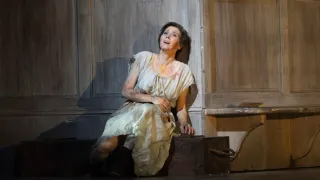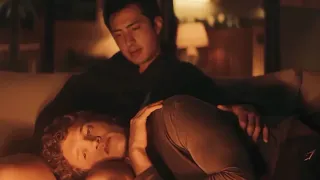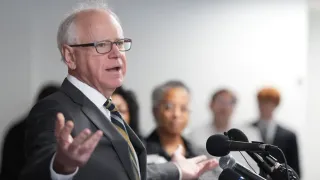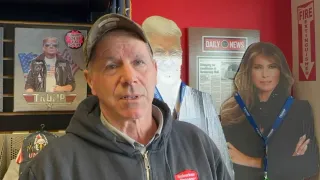September 30, 2024
From 'Teacher of the Year' to Meth User to Recovery at the Pride Institute
Dale Pauly READ TIME: 7 MIN. SPONSORED
As a driven young man, Eddie seemed to have it all – but just beneath the surface, a storm was brewing. "Those of us who grew up before the age of more – I'll call it 'acceptance' – believed intrinsically that we were bad people," he says. "Either we're going to hell or we were not accepted. Society told us that, right? So how do we get by that? We have to be the best little boys and girls and women and men in the world. That's the way we do it."
Eddie's family dynamics only reinforced his drive toward perfection. "I grew up in a family of professional athletes, number ones in their classes from Georgetown and dentistry school and all these things," he explains. "So I went to college for a political science degree. I got a scholarship for voice. I ended up doing this and that, and this and that. And everyone's like, 'Oh my gosh, Eddie, you are so talented.' Well, no shit. I have to be talented in order to convince you that I'm not a horrible person. And it's a revolving wheel of shame and fear."
Cracks in the veneer emerged when Eddie left the political path to follow his passion for education, which necessitated hiding his identity as a gay man. "That was a moment that I went back in the closet and decided to live the shame response," he says. "I ended up being a high school basketball coach for one of the best schools in the country as an LGBTQI+ man. And I didn't say anything.
"But on the weekends, what was I doing? I was living the secret life that inside I needed to live. So when the ball dropped on Friday night and I'm done, I'm out the door. I'm in Washington, D.C., an hour and a half away from my house, having sex and using meth. Well, it makes sense, right?"
In meth, Eddie saw a form of freedom. "I was the guy who was getting great grades, a master's degree, Teacher of the Year, all of these things in the state of Maryland, right?" he explains. "And all I wanted to do was be free. All I wanted to do was live the life that I was on a farm, running around with cows, doing whatever. The dopaminergic reaction that came with meth said, 'I'll take that all away from you.' Almost like a genie in a bottle. 'I will take all of that away from you and you can be a kid again.' Who wouldn't want that?"
Meth also fooled him into thinking that it could help him find love. "What meth allowed me to do was just to drop fear for a minute and attach back to what I defined as love, what I saw as love," he says. "And that was hugely powerful, because everything on the outside protected me from [other people]. My parents and my family and everybody else said, 'You're going to be hurt.' But meth got that there was this this kid inside who was like, 'I'm free. I'm out. I'm a rebel.'"
What meth hadn't told him is that it would actually lead him down a dark and grueling path that included an astounding 55 treatment centers and five years of homelessness. Now with Pride Institute's help, he's been clean for more than three years.
"Pride Institute allowed me to really battle the idea of both that fear of what I couldn't do, and also the LGBTQI+ spectrum aspect of my life," he says.
Eddie admits that one of the stumbling blocks he'd encountered in previous treatments was a persistent inability to see himself on the same plane as other recovering residents. "Lies we tell ourselves, right?" he says. "That is a big one. I defined myself by my story, and my story was the only story that existed because I had to feel important. I had to be important to somebody. And the only importance that I could give to somebody is what I did. So when I would hear somebody's story, all I was listening to were the facts. I was like, 'Oh yeah, you went here? Oh gosh, you have this many parents? You're a single mom? I can't relate to that.'"
Then, he says, there was a part of him that started getting ready to be sober. "I started, without the codependent attachment response, I started hearing the sorrow, the morose, the melancholy, the despondence, those feelings," he says. "And all of a sudden, without a reaction, I started going, 'Oh, I relate to that feeling. I relate to what they're going through, not where they've been.' I couldn't pinpoint it, but what I knew is that the person who grew up with no family, didn't get an education, who has no teeth, who is an alcoholic, was somebody who felt just like I did – alone, unlovable, not enough."
Now well over three years into his recovery thanks to Pride Institute, Eddie has learned to let go of fear and rediscover real love. "Fear is the weapon of shame," he says. "It's shame's armor, right? It keeps us very safe. But I believe love leaves breadcrumbs. In our life story, we're going to find her again. We have to go through some pretty trying times, but when you take fear away and shame's armor just drops away and we let it go, we're back to where we were when we were born. We're back into the loving space again."
More of Eddie's story and those of many more LGBTQ+ folks in recovery can be heard at Pride Institute's Proud Voices podcast, available on major podcast platforms. Extensive information about Pride Institute's residential treatment programs is available on their website.






